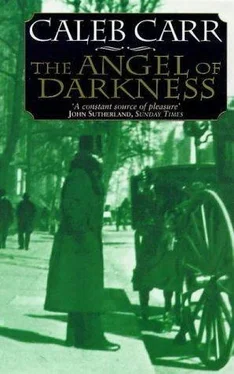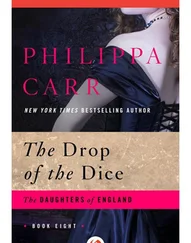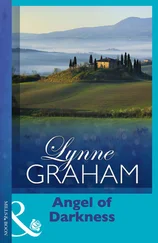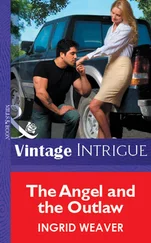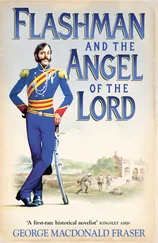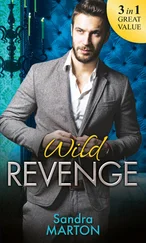Caleb Carr - The Angel Of Darkness
Здесь есть возможность читать онлайн «Caleb Carr - The Angel Of Darkness» весь текст электронной книги совершенно бесплатно (целиком полную версию без сокращений). В некоторых случаях можно слушать аудио, скачать через торрент в формате fb2 и присутствует краткое содержание. Жанр: Детектив, на английском языке. Описание произведения, (предисловие) а так же отзывы посетителей доступны на портале библиотеки ЛибКат.
- Название:The Angel Of Darkness
- Автор:
- Жанр:
- Год:неизвестен
- ISBN:нет данных
- Рейтинг книги:5 / 5. Голосов: 1
-
Избранное:Добавить в избранное
- Отзывы:
-
Ваша оценка:
- 100
- 1
- 2
- 3
- 4
- 5
The Angel Of Darkness: краткое содержание, описание и аннотация
Предлагаем к чтению аннотацию, описание, краткое содержание или предисловие (зависит от того, что написал сам автор книги «The Angel Of Darkness»). Если вы не нашли необходимую информацию о книге — напишите в комментариях, мы постараемся отыскать её.
The Angel Of Darkness — читать онлайн бесплатно полную книгу (весь текст) целиком
Ниже представлен текст книги, разбитый по страницам. Система сохранения места последней прочитанной страницы, позволяет с удобством читать онлайн бесплатно книгу «The Angel Of Darkness», без необходимости каждый раз заново искать на чём Вы остановились. Поставьте закладку, и сможете в любой момент перейти на страницу, на которой закончили чтение.
Интервал:
Закладка:
“Hmm,” Mr. Picton noised. “Which would seem to lead back to the idea that Darrow may be holding on to some sort of an insanity card, in case he needs to play it later. Although I wouldn’t think him so stupid.”
“Nor would I,” the Doctor agreed. “The insanity defense, when introduced midway through a trial, is rarely effective-few juries fail to recognize a change in plea as an act of desperation.”
“Well, then,” Mr. Moore said, looking blankly from the Doctor to Mr. Picton, “what do you suppose Darrow’s up to?”
The Doctor just shook his head slowly. “I don’t know-and that fact disturbs me. Indeed, there is much about our opponent that disturbs me.” Pacing by the window, the Doctor rolled his wineglass in his hands. “Did you discover when White is to arrive?”
“Tuesday night,” Lucius said. “After the trial’s begun.”
“Leaving me little time to confer with him,” the Doctor answered, nodding again. “Yes, it’s the smart move. But what in God’s name is it that Darrow wants him to say?”
We’d learn the answer to that question soon enough; and it, like almost everything else about Mr. Darrow, made it easy to understand just why he would one day become the greatest criminal defense lawyer the country has ever seen.
CHAPTER 43
Our education began on Tuesday morning, when men called in from fields, shop counters, and parlor rooms all over Saratoga County crowded into the Ballston Spa court house to find out whether they’d spend the next couple of weeks as jury members in what was becoming popularly known as “the Hatch trial.”
From the beginning of this process, Mr. Darrow showed that he knew exactly what Mr. Picton was up to, and that he intended to frustrate him at every turn. Both sides were given twenty of what they called “peremptory challenges”-the right to refuse a jury candidate for no stated reason-and the first ten of Mr. Darrow’s were exercised on men who couldn’t have fit the Doctor’s and Mr. Picton’s description of an ideal juror any better. Each man was poor but sharp, with a kind of wisdom about the world what didn’t seem to fit with the fact that most of them had never been out of the county, much less the state. When his turn came to question these fellows, Mr. Darrow was nice enough to them-he cared too much about working the crowd in the galleries not to be. He’d strike up a pleasant conversation about the state of business in town or about how the wet, cool weather that summer was affecting the local crops; but the minute any man mentioned, say, the fact that he’d grown up in a one-room farmhouse or, worse yet, that his mother, grandmother, aunt, or sister had on occasion been given to violent behavior, he found himself dismissed with a friendly “Thank you” (but no word of explanation) from the counsel for the defense.
Mr. Picton, for his part, wasn’t fooled by the seemingly innocent, humble way that Mr. Darrow questioned the better-off, more educated jury candidates about the “natural state” of men and women, and whether or not human society could’ve deteriorated to the point where the most basic attachments between members of the species-“the natural law of human society,” as Mr. Darrow put it-might be broken without any cause. Mr. Darrow didn’t say outright that the bond between a mother and her children was part of said “natural law”; he didn’t have to. It was clear that most of the people in the courtroom silently believed such to be the case. But in the same way that Mr. Darrow had dismissed any potential juror who spoke openly about female violence, so did Mr. Picton give the axe to any man who voiced a belief in such “natural” or “fundamental” attachments. Mr. Darrow eventually protested that Mr. Picton seemed to be throwing out the “entire concept of natural law,” a notion what he declared was the foundation of the American Constitution and the Declaration of Independence. Mr. Picton answered that it wasn’t the business of the court to get into such philosophical discussions-they were concerned with criminal, not natural, law. It was an attitude that, while it didn’t earn him any affection from Judge Brown, was perfectly proper and within his rights, and many candidates what Mr. Darrow clearly preferred were duly sent packing.
By noon each man had used up the better portion of his peremptory challenges, and had rejected a few jurors for specific cause, to boot, so that when the midday recess was called only half the jury had been selected. It looked like the afternoon session might get a little testier than the morning had been, for when one or the other of the lawyers ran out of peremptories it meant that he’d have to start coming up with full sets of reasons for rejecting a given candidate. By three o’clock the peremptories on both sides were gone, with five jurors still to be selected; and while Mr. Picton figured that most of the men already in the box were characters that he could probably persuade to see things his way, he also suspected that Judge Brown was a lot more likely to be sympathetic to Mr. Darrow’s stated reasons for rejecting candidates than he would be to the prosecution’s. This suspicion proved justified. Mr. Darrow just kept repeating the idea that “natural law” was the mainstay of all of American government and society: if any man accepted the idea that the “bonds of nature” could be “capriciously broken,” Mr. Darrow said, he was basically saying that the United States itself was a seriously flawed concept-and if he felt that way, said man had no business serving on an American jury.
It was, as the Doctor put it, “ludicrous but singularly effective logic,” expressed by Mr. Darrow as if it were a deeply held conviction but more likely created for the particular case and town he found himself working. (This idea seemed confirmed when we found out that Judge Brown had served as an officer in the Civil War-a fact what Mr. Darrow had most likely discovered.) Mr. Picton had no similarly simple philosophical justification for rejecting jury candidates; in fact, he had no reason at all that appealed to Judge Brown’s old-school patriotism. He could only keep protesting that people’s personal feelings about politics, philosophy, or even religion shouldn’t be allowed to influence their judgment in a criminal proceeding, where guilt or innocence were determined by evidence, not beliefs. Such thinking was a little bloodless for the likes of Judge Brown, and as the shadows grew longer on the courtroom floor it began to wear on him pretty clearly, while Mr. Darrow’s deliberate attempts to appeal to the old man’s deepest sentiments-voiced, as they were, in the “plain” Midwestern oratory what Mr. Darrow had obviously mastered-only seemed to grow more colorful and persuasive.
By the time all twelve seats in the jury box had been filled, there was no real way to determine which side had the upper hand in terms of the personal inclinations of the men in the chairs. But if I’d been forced to bet on it, I would’ve said that the balance was leaning in Mr. Darrow’s favor-and the fact that Mr. Moore brought word back from the Casino that night that the odds against a conviction had gone up to sixty to one seemed to bear this feeling out. For Mr. Picton, the battle would start out as an uphill one.
Still, we did have witnesses and evidence in our favor, and there wasn’t any real reason yet to believe that these wouldn’t change the opinions of even those jurors what were privately inclined to view the charges against Libby Hatch with some doubt; after all, Sheriff Dunning had started out skeptical about the prosecution’s case, but’d had his mind thoroughly changed by the grand jury proceedings. Knowing all this, Mr. Picton stayed in his office very late on Monday night, going over his opening statement (to be delivered the next morning) and also the schedule according to which he planned to reveal circumstantial evidence and call witnesses. Mrs. Hastings asked me to take some food up to the court house at about midnight, and I found Mr. Picton still going like a madman, smoking, reading, rehearsing, and once again having at the hair on his face and head like he was intent on doing himself some injury. The sight made me marvel all the more at how he was able to come across so cool and collected in the actual courtroom: I knew that there was no telling where a particular person might feel the most at ease with the world, but the difference in this case between the anxious, slightly peculiar man we knew outside the courtroom and the steady, brilliant lawyer we saw pursue the case against Libby Hatch was so extreme as to be confusing.
Читать дальшеИнтервал:
Закладка:
Похожие книги на «The Angel Of Darkness»
Представляем Вашему вниманию похожие книги на «The Angel Of Darkness» списком для выбора. Мы отобрали схожую по названию и смыслу литературу в надежде предоставить читателям больше вариантов отыскать новые, интересные, ещё непрочитанные произведения.
Обсуждение, отзывы о книге «The Angel Of Darkness» и просто собственные мнения читателей. Оставьте ваши комментарии, напишите, что Вы думаете о произведении, его смысле или главных героях. Укажите что конкретно понравилось, а что нет, и почему Вы так считаете.
